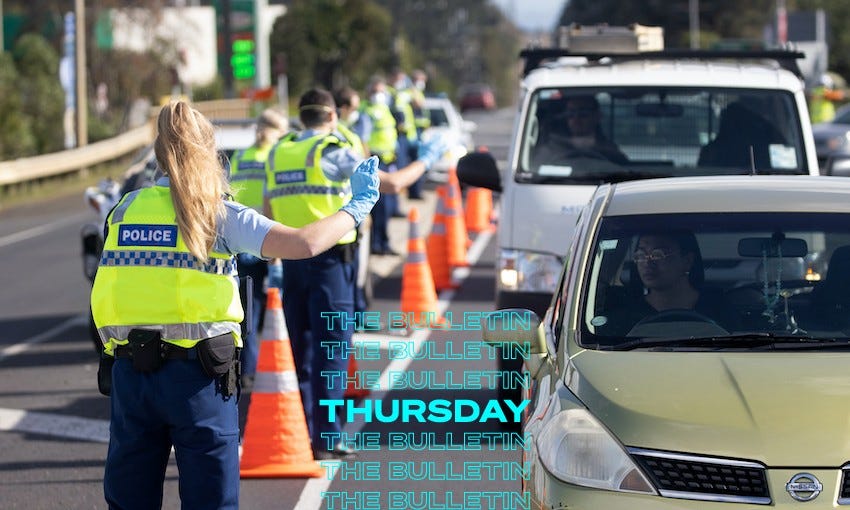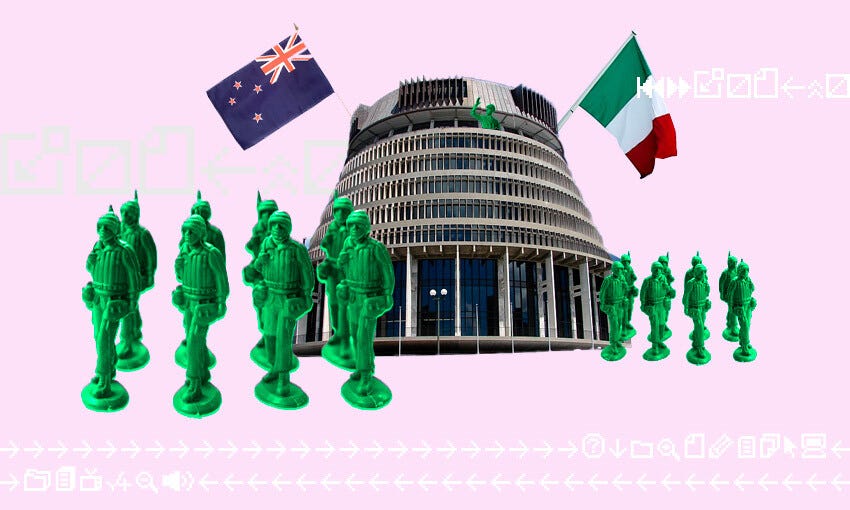Government considers travel slots to leave Auckland
A hard border will remain around Auckland this summer and only the fully-vaccinated with a negative Covid-19 test will be allowed to travel, according to the prime minister.
Mōrena and welcome to The Bulletin for Thursday, November 4, by Justin Giovannetti. Presented in partnership with Z Energy.
In today’s edition: New rules for medical exemptions to the jab; Southland considers coal; record low unemployment; but first, Auckland’s summer with borders.
Police stop cars at a checkpoint during the 2020 outbreak (Brendon O'Hagan/Bloomberg)
Aucklanders will face restrictions over a classic Kiwi summer. The prime minister confirmed that the hard border around Auckland will remain over the summer, with only fully-vaccinated residents allowed to travel outside the city. She made the revelation on ZM radio yesterday and according to the NZ Herald, the double jabbed will also need to show a negative Covid-19 test before leaving Auckland on holiday. After earlier promising a “classic Kiwi summer,” Jacinda Ardern said the internal border will be necessary while other parts of the country work to increase their vaccination rates. New Zealand doesn’t have much experience with internal borders on the country’s busiest motorways, so the government is now trying to figure out how to deal with expected traffic.
There could be a system to provide travellers with time slots. Speaking to RNZ in the evening, Covid-19 response minister Chris Hipkins said his office is working through options, but he offered up only one: “So it might be that people are allocated a time they can travel”. Asked if it would be run like the country’s border facilities, he said no, adding over a garbled connection that police will be able to “expand capacity faster” on the land border than at MIQ. It’s unclear how slots would be allocated or how they would work, but travellers would need to show their vaccination passports and negative Covid-19 tests at checkpoints on the motorway.
“They should expect that it will be a reasonably time-consuming process if they are travelling by land,” said Hipkins, but he added that it would be better than the alternative: “We don’t want to end up with people spending days sitting in their cars and have all of Auckland grind to a halt”.
The political backlash to even considering the option was immediate. Act leader David Seymour said that the government has completely lost the plot if it expects to provide people with time slots to clear border checkpoints. “The queues and pressure on police time are unworkable and the suggestion the government might allocate times for people to move simply brings the absurdity into sharp relief,” he said.
National leader Judith Collins was succinct, tweeting: “Not on my watch.” Then she retweeted a picture of checkpoint Charlie on the Berlin Wall.
Are you a keen consumer of local business journalism? We're looking to find out a bit more about The Spinoff's business audience, so if you've got five minutes to spare this morning we'd love for you to take a quick survey.
Medical exemptions for the vaccine will be centralised. If you paid for a health professional to write you a medical exemption for the jab, “ask for a refund”, that’s the message from director-general of health Ashley Bloomfield. As RNZ reports, any exemptions will now be centrally approved by the government. The Covid-19 minister said most of the exemptions were “a ripoff scheme” and the number that will be accepted will be very small. School principals had been looking for help from government after some teachers had handed in exemptions they told RNZ seemed dodgy and were signed by homeopaths.
Death in isolation. The ministry of health reported last night that someone infected with Covid-19 and isolating at a Manukau address has died. The cause of death is unknown.
The Covid numbers: There are 58 cases in hospital and 3 in ICU/HDU. There are now 2,019 active cases in New Zealand. 97 new community cases were reported in Auckland yesterday, 3 in Waikato. 28,921 people were vaccinated on Tuesday.
The Spinoff’s Covid data tracker has the latest figures.
While Cop26 is underway, Southland looks to coal. The daily headlines are dominated by global pledges to sharply reduce emissions and pivot to renewable energy by 2030. However, two stories in The Southland Times illustrate the scale of the challenge. Exploration is underway for a new coal mine near Invercargill that could open in 2022 and yield 600,000 tonnes of the black stuff. While Southland councillors are calling for limits on carbon farming, planting trees to absorb emissions, because of fears of losing quality pastoral land.
Unemployment is at a record low in New Zealand. Only 3.4% of New Zealanders are unemployed, matching the record low in December 2007. As Stuff reports, the figure reflects worker shortages reported across the economy from the closed border and the possibility that some of the unemployed can’t search for work due to Covid-19 restrictions. However, the rate of people who want more work or aren’t actively searching also fell to 9.2%. Extremely low unemployment coupled with high inflation means workers have a pretty persuasive case for a pay hike.
Next week is Apec Leaders' Week. As part of the Voices of the Future summit New Zealand’s youth are helping shape a declaration to Apec Leaders as the region sets a plan for the next 20 years. The Spinoff spoke to three delegates ahead of the event. Read the story here – created in partnership with Mfat.
The Bay of Plenty is preparing for the return of cruise ships. Nearly two years after the last cruise ship was seen in Tauranga harbour, bookings for trans-Tasman voyages are being made for early 2022, SunLive reports. Norwegian, Carnival and P&O are selling packages that encompass stops in New Zealand and Australia from February. The country’s maritime border is closed to foreigners and the government has signalled no intention to change that. With the early days of the pandemic marked by outbreaks on cruise ships (Remember breathless coverage of the Diamond Princess?), they might not be the first to get through.
If we get a third supermarket chain, who could it be? Two very different futures were shown to the Commerce Commission for a new competitor as it looks into the grocery sector, Newsroom reports. One is an iwi consortium focused on health and community, the other is Costco. Both Foodstuffs and Woolworths are very strongly opposed to a government move to break them up in any way.
Got some feedback about The Bulletin, or anything in the news?
Get in touch with me at thebulletin@thespinoff.co.nz
Right now on The Spinoff: Dylan Reeve looks at a new Covid-19 conspiracy theory that the Italian military is in New Zealand with big plans. KDee Aimiti Ma’ia’i & Marco de Jong warn that NZ can’t abandon the Pacific during its climate change moment. Leonie Hayden writes about Indigenous voices speaking up on climate change. Madeleine Holden reports that parasocial relationships are here to stay and whether we should be worried. Chris Parker speaks to The Real Pod about the greatest improv of his life.
For a longer read today, scientists prepare for the end of the pandemic. Reuters provides a country by country analysis of how and when Covid-19 is expected to transition to an endemic disease in the coming years. The dozen scientists interviewed offered a somewhat positive prognosis, that a global vaccination effort will finally bring Covid-19 under control over the coming year. Many expect that the current delta wave in the US will be that country’s last major surge. It’s a good read to prepare yourself for, well, the rest of history. Here’s a taste:
“They expect that the first countries to emerge from the pandemic will have had some combination of high rates of vaccination and natural immunity among people who were infected with the coronavirus, such as the United States, the UK, Portugal and India. But they warn that SARS-CoV-2 remains an unpredictable virus that is mutating as it spreads through unvaccinated populations.”
A decade after hockey tried a new rule to change the trajectory of the sport. There are parts of NHL hockey that seem completely normal to watchers of the sport that obviously shouldn’t be, like large men throwing punches at each other. But there’s a lot of grey area. It’s a sport where players move at high speeds surrounded by hard boards and there’s an entire vocabulary to describe hits and crashes. Some of it is completely unavoidable, some of it is not. However, overt violence is in decline as ESPN reports, a decade after the NHL brought in rule 48 and a powerful league official to decide when a hit goes beyond acceptable.
That's it for The Bulletin. If you want to support the work we do at The Spinoff, please check out our membership programme.







